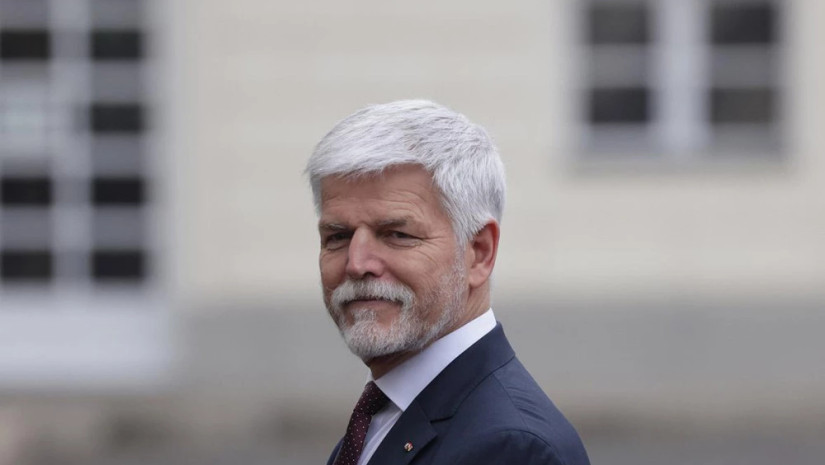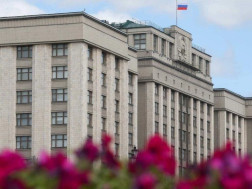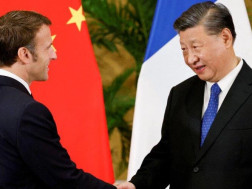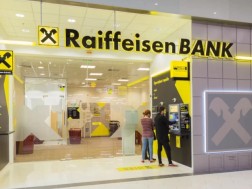Czech President Petr Pavel says security services should monitor Russians living in the West, calling it "simply the cost" of the Kremlin's war against Ukraine.
Speaking in a wide-ranging interview with RFE/RL's Ukrainian Service on June 14, the former senior NATO official also said he expects to hear "strong language" about long-term support for Ukraine during the military alliance's summit next month along with an acknowledgement of the importance of having Ukraine as a member.
Pavel said that while he has empathy for Russians outside the country who face hardships over Moscow's decision to launch a full-scale invasion of Ukraine in February 2022 -- a decision they may not support -- "when there is an ongoing war, the security measures related to Russian nationals should be stricter than in normal times."
"All Russians living in Western countries should be monitored much more than in the past because they are citizens of a nation that leads an aggressive war.... That's simply the cost of war," he said.
Pavel noted that in World War II, Japanese descendants living in the United States were under "a strict monitoring regime as well." RFE/RL has reached out to Pavel's office for a clarification of what such a "strict monitoring regime" would look like.
Internment camps were established during World War II by U.S. President Franklin D. Roosevelt where people of Japanese descent, including U.S. citizens, were incarcerated. About 120,000 people -- the majority of whom were American citizens -- were affected by the move.
The Czech president, whose role is largely ceremonial, said the support expressed for Ukraine when NATO leaders gather on July 11-12 in Vilnius, Lithuania -- with Ukrainian President Volodymyr Zelenskiy expected to be present -- will highlight the significance of the event.
"What I expect is really strong language when it comes to long-term support of Ukraine. I see a number of countries agreeing on a long-term plan of support to Ukraine that will not be based on one-off contributions but on a carefully planned long-term procedure," Pavel said during the interview at the Prague headquarters of the U.S. government-funded broadcaster.
When President Vladimir Putin launched his full-scale invasion of Ukraine in February 2022, Russian officials said one of his justifications was concern Ukraine was moving toward joining the military alliance.
While post-Soviet countries such as Ukraine and Georgia have sought for decades to distance themselves from Moscow, all they received were vague promises that fell far short of a pledge of accession.
That has all changed with the war in Ukraine, and Zelenskiy has pressed NATO over membership, saying recently his country is "ready to join" and the alliance must make a decision about Ukrainian membership at the summit.
Pavel, whose country joined NATO in March 1999, said that while the accession process cannot start when a country is still at war, he would welcome "clear language" about future membership once the war is over.
"I strongly believe that all the leaders will understand that having Ukraine on board -- both in NATO and EU -- is probably the only guarantee [of] how to ensure stability in this region, how to make both NATO and EU stronger, and how to keep Russia and its aggressive policies at bay," he said.
He said he has heard two scenarios about how NATO will proceed on the question of Ukrainian membership. One is to use guarantees like those provided to Finland between the initial move to accession and its ratification in April.
Another would be akin to the security guarantees that NATO offers Israel, he said, predicting that the end result probably will depend on how much countries will be willing to commit.
"If we just put on paper what we already are doing for Ukraine and make it a kind of a guarantee, including the long-term plan, it sounds like a guarantee to me," he said.
As a chairman of the NATO Military Committee, Pavel visited Ukraine at least three times and observed the progress the Ukrainian military was making. That progress has only sped up since the war began in February 2022, he said.
He said that if it were a member of the alliance today, the Ukrainian military would be "without any doubt the most experienced military in NATO." He said that in technical and procedural terms, the Ukrainian military will very soon will be ready for NATO membership.
Pavel added, however, that there is a disadvantage to having such diverse equipment now in its arsenal, and when the war ends there will have to be a "stabilization and unification of equipment." But he called this "a technical issue" that is overshadowed by the determination of Ukrainian soldiers.
Asked to assess the first days of Ukraine's counteroffensive, Pavel said he would call it "shaping operations," as he believes the "true counteroffensive" has not yet begun.
Shifting to Ukraine's EU membership aspirations, Pavel noted that he has already said he sees Ukraine as a future member and would link membership to postwar reconstruction.
The accession period for any aspirant country requires the candidate to meet successive goals that can be used within the reconstruction process, he said. The Czech Republic has already started a conversation on how it can offer its expertise and resources in terms of reconstruction, and Pavel says the earlier the projects start the better for both sides.
Asked about concerns that China would play an outsized role in the reconstruction of Ukraine, he said he suspects China will be more active during that phase than it was in trying to use its influence on Russia to prevent the war.
"We will have to keep an eye on such an effort because it is clear that China will not do it from humanitarian reasons, but simply to get influence and control."
He said he regretted that China didn't take a more active role from the very beginning -- on one hand, discouraging Russia from continuing aggression, while one the other, using its weight to come up with viable peace proposals.
"China didn't take that chance. I believe that China is behaving in their own interest," he said. "They are using this conflict…to get a stronger position globally."
Source: RFE/RL
















